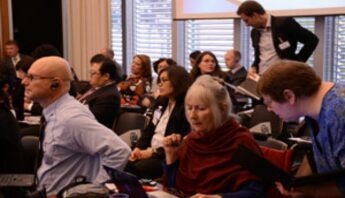Next week the Stockholm Convention's Persistent Organic Pollutants Review Committee is convening again, an event insiders refer to as POPRC 6 (pronounced "pop rock"). Today's post will serve as the "pre-game show" for the meeting, highlighting what's a stake. On October 8 I fly to Geneva to attend the weeklong meeting, and with any luck I'll manage to update GroundTruth with a few dispatches from the meeting and then a "post-game" debrief afterward.
The POPRC is the panel of international experts that advises the Convention (aka POPs treaty), the agreement between 172 nations (the U.S. not among them) to eliminate the production and use of persistent organic pollutants like PCBs and dioxins and organochlorine pesticides like chlordane and lindane. As Pesticide Action Network Senior Policy Analyst Kristin Shafer explained in a recent post, the chemicals targeted by the Convention are the worst of the worst: the ones that build up in our bodies, persist in our environment, and disturb the delicate balance of hormones. Children and infants are particularly at risk.
The Stockholm Convention is the one forum where the world comes together to consider taking action on these poisons. And it's at these meetings were rubber hits road. It's one thing to make lofty statements about the importance of environmental protection and of ridding the world of persistent organic pollutants, as the Ministers of the Environment for a variety of countries did during the so-called "High Level Segment" of least year's Stockholm Convention meeting. It's another to actually do something about these issues, like phasing out the use of these chemicals completely, and putting resources into cleaning up stockpiles and waste. So far, the gap between good intentions and meaningful action has been huge.
And so we'll see what happens next week in Geneva. The issues to be considered by the include:
- Should endosulfan — an antiquated insecticide which they've already agreed "is likely…to lead to significant adverse human health and environmental effects such that global action in warranted" — be banned? It's already banned in more than 60 nations, and the U.S. is currently phasing it out, but a few countries claim that they can't do without it. And the companies that make it will be in Geneva to defend it; in fact they've been keeping busy writing baseless and accusation-filled letters to the Convention.
- Should we allow foam laced with brominated diphenyl ethers — a family of flame retardants just added to the Convention due to their persistance and the threat they pose to human health and the environment — to be recycled into carpet and other materials intended for homes? Many countries, including the U.S., think this low-cost option is best.
No one ever said getting rid of these pollutants would be easy; if it were, we wouldn't need an international agreement. Fundamentally, the delegates in Geneva have to decide whether to rise to the challenge or content themselves with speeches about the importance of the environment. Are we willing to risk the possibility of having to pay slightly more for cashews and cotton? Is it worth investing in educating small scale farmers about non-chemical pest control? My colleagues from NGOs around the world and I will be there to remind the POPRC that ultimately such costs will be repaid with substantial interest.







